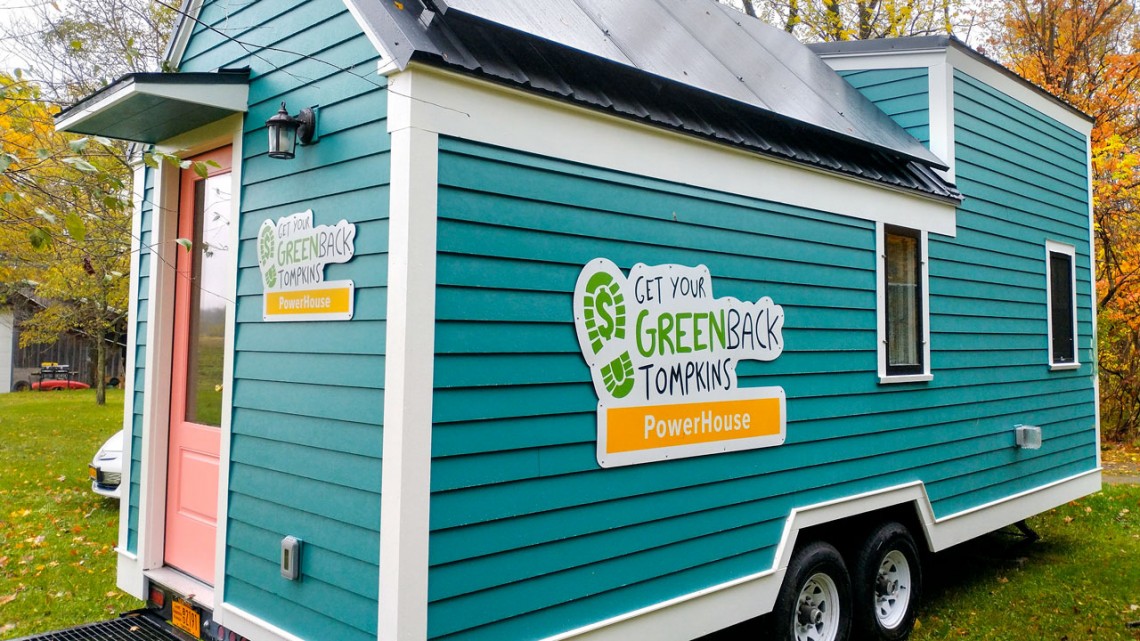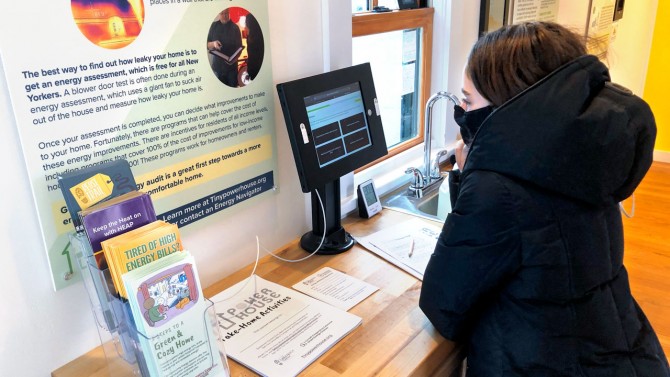
The Get Your GreenBack Tompkins PowerHouse, operated by Cornell Cooperative Extension Tompkins County, is a mobile education and outreach station that houses energy saving innovation demonstrations.
CCE tiny house makes powerful energy impact
By Melissa Jo Hill
Built on top of an 8-by-24 foot trailer and weighing around 12,000 pounds, the PowerHouse looks smaller than most RVs and boasts signature tiny house touches like cheerful blue paneling, a pitched roof and a friendly pink door to welcome visitors.
But inside, where tiny home builders would typically tuck away hidden storage and multi-use furniture, are a variety of energy-saving innovation demonstrations, turning it into a mobile education and outreach station.
Part of the Cornell Cooperative Extension (CCE) Tompkins County Get Your Greenbacks program, the PowerHouse helps CCE educators tackle environmental issues and social inequities by making energy savings concepts tangible and easy to understand. Displayed across the Southern Tier, and soon other areas of New York state, the PowerHouse is staffed by members of the CCE Tompkins County Smart Energy Choices program, which operates Get Your Greenbacks Tompkins.
“We hope visitors will leave the PowerHouse with greater energy literacy,” said Emily Belle, community energy outreach and advising program leader for Get Your GreenBacks Tompkins. As COVID-19 restrictions ease, she hopes to take the PowerHouse on the road to reach more residents of New York state. “Once folks understand these concepts, our educators can point out incentive programs and rebates to help offset the costs of any upgrades.”
Inside the PowerHouse, demonstrations such as “Who Let the Heat Out?” show how small air leaks in homes can add up to the equivalent of leaving a window open. Visitors are encouraged to schedule a no-cost whole-home energy assessment or audit, so they can fix those leaks with economical solutions like caulk or spray foam.
The PowerHouse also features both new energy-efficient (and more expensive) windows alongside salvaged windows with cheaper solutions like blinds and sheet plastic, so visitors can test the temperatures around each with a thermal camera and decide which option is right for them.
A cold-climate air-source heat pump heats the PowerHouse in the winter and cools it in the summer – an energy innovation that can result in thousands of dollars in energy savings over the lifetime of the equipment. All the exhibits are solar-powered, thanks to the panels installed on the roof.
“The PowerHouse is a big flashy thing,” Belle said. “But the real work goes on behind the scenes,” with local educators providing assistance and education for smart energy upgrades that are both green-and budget-friendly.
Southern Tier households spend around 9.8% of their income on energy, according to a 2017 report by the New York State Energy Research and Development Authority (NYSERDA). Additionally, energy costs were a greater source of anxiety during the COVID-19 pandemic, especially among Black communities, research has shown. A 2021 white paper by The Smart Energy Consumer Collaborative found that while energy costs were a source of concern for 34% of white households, for Black households that number rose to 56%, and 52% for other people of color.
The CCE Tompkins energy programs aim to lower the financial burden of energy on low-to moderate-income households to a maximum of 6% of total income – New York state’s goal.
In addition to trying to lower costs, CCE Tompkins is helping individuals and communities reduce their carbon footprints. According to NYSERDA’s 2015 New York State Greenhouse Gas Inventory, more than 20% of New York’s greenhouse gas emissions are linked to home energy use, and reducing greenhouse gas is one way to make an impact on climate change.
Any New York state resident interested in learning more can visit www.tinypowerhouse.org or email PowerHouse coordinator Emily Belle to get connected with a county-specific community energy adviser.
Melissa Jo Hill is communications specialist and writer with Cornell Cooperative Extension.
Media Contact
Get Cornell news delivered right to your inbox.
Subscribe
